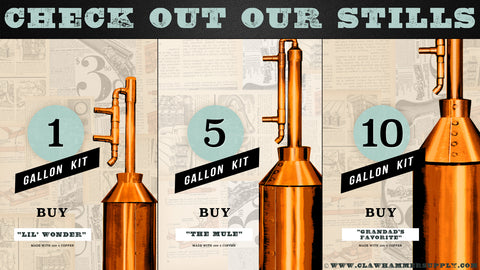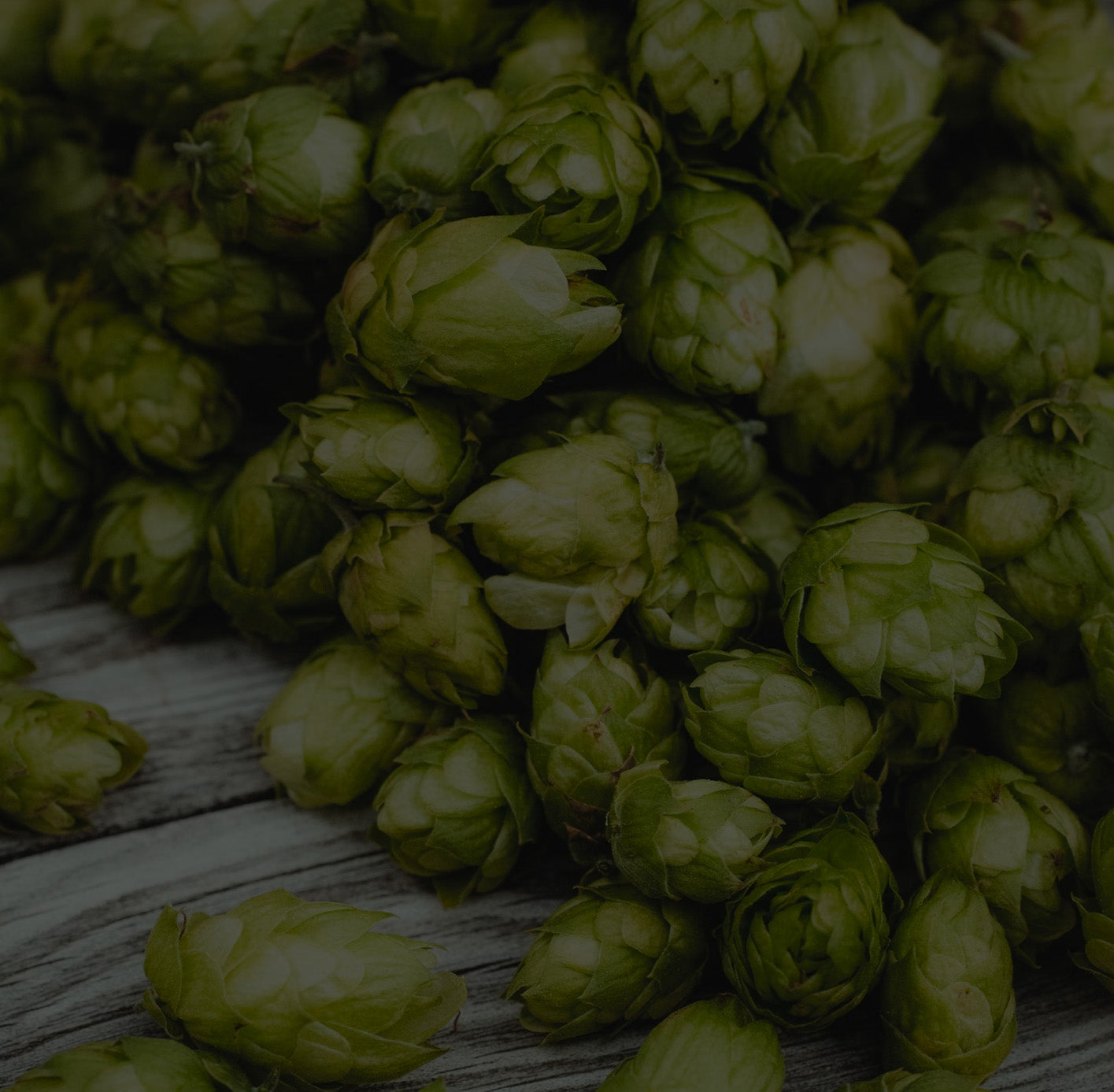
SHTF Prepping
Why should distillation equipment be added to a prepper's equipment checklist? Here are 4 excellent reasons, to name a few: distilled spirits, fuel alcohol, antiseptic, and water. These goods would be highly valuable during a SHTF event (where there is a total breakdown of supply chains, government oversight, etc.) and can all be easily manufactured with simple, small-scale distillation equipment. As a bonus, all of these goods would be highly desirable in a barter economy.
Whiskey
Let’s start by talking about distilled spirits. It is currently illegal to make alcohol at home for consumption. However, lets imagine for a second that there is a complete meltdown of global economies, supply chians, and even government. In a world where supplies are scant and governmental rules and regulations are non-existent, knowing how to make spirits would be a great skill to have. Why? Spirits aren't necessarily a "must have" item in a survival situation. But think for a second about how one would pay for tings if "money" was suddenly no longer worth even the paper it was printed on. Bartering with spirits could be very valuable.
It's an interesting concept to think about, but crafting spirits for bartering wouldn't come without risks. Distilling isn't rocket science, but it can be dangerous if proper saftey protocols aren't followed. We've put together a non-exhaustive list of "Distillation Safety Tips" which is especially relevant to individuals who may be inclined to learn how to distill alcohol.
Fuel
Fuel is included on many, if not all survival prep lists. Here are a few things to keep in mind on this topic: First, there are many types of fuel and different types have different uses. Second, a good fuel strategy is one that provides fuel based on expected need as well as one that provides provisions for replenishment. We’ll address all of these issues below.
The two primary fuel categories are stationary and mobile. Here are examples to help clarify. Wood and coal are both stationary fuels and are appropriate for heating and cooking, in a set location. Gasoline and diesel are mobile fuels and are appropriate for powering mobile equipment such as a cars, motorcycles, and tractors.
Some fuels can be used as stationary and mobile fuels while others cannot be or at least should not be. For example, wood is great for heating and cooking but it’s useless as a mobile fuel. Gasoline, a mobile fuel, will power a small engine, but it’s not the best for cooking, and relying on it as a long term heating strategy would be very unwise considering the amount of fuel that one would need to keep on hand.
Finally, mobile fuels such as gasoline, diesel, and kerosene have limited shelf lives and will be subject to supply issues during instances of widespread infrastructure meltdowns.
Considering the above mentioned facts, one potential fuel supply strategy would involve a good stockpile of wood and relative close proximity to a source for more, as well as a renewable mobile fuel source. Because the mobile fuels listed above will be subject to supply limitations and producing them will be very difficult, if not impossible, we cannot recommend them. Natural gas and propane could also be used as mobile (and stationary fuels), but they’re subject to the same limitations as the others. Fortunately, there is a mobile fuel that is quite easy to produce, keeps well, and doubles as a mobile as well as a stationary fuel: alcohol.
In order to make and use alcohol as fuel, a distiller needs a fuel alcohol permit.
To use alcohol as a fuel in a small engine, it would ideally be 100% pure. This is an issue, because fuel alcohol produced by means of distillation maxes out at a purity of about 95%. Re-distilling will not result in a higher proof product. To remove the last bit of water from the fuel, it must treated with a drying agent. Interestingly, according to scientists at Purdue University, corn grits and even tapioca can be used to remove water from ethanol.
Reflux column stills, specifically forced reflux fractionating stills, are the most appropriate for this task, as they’re more efficient at making the high alcohol content needed for use in engines. Though, considering that there are many uses for alcohol, all requiring different proofs, the best still for a prepper would likely be a hybrid still that can be run with or without fractionating and forced reflux.
Hybrid stills employ the use of a column which can either be packed, and used as a reflux still for fuel alcohol, or can be left empty to make distilled water. A commercial distiller could make whiskey & antiseptic with a hybrid still that has an empty column. Read more about types of distillers here.
Antiseptic/disinfectant
There are plenty of other uses for alcohol aside from whiskey and fuel. For example, high strength ethyl alcohol (the kind produced by fermenting sugar and then concentrating it with a still) is a versatile product that doubles as an antiseptic as well as a disinfectant. This means that it’s effective at cleaning wounds but can also be used to clean hard surfaces. It’s a broad-spectrum antimicrobial and is highly effective at killing bacteria, viruses, and fungi. Antiseptic and disinfectants are very useful and should be considered highly valuable by SHTF preppers.
Antiseptics & disinfectants, just like alcohol for consumption, can only be made by commercial distillers. It is illegal to distill this at home.
There is one very important piece of information that a commercial distiller should consider when producing antiseptic: the strength of the alcohol greatly alters its effectiveness and stronger is not always better. Generally, the antimicrobial activity of alcohol is significantly lower at concentrations below 50%. So, when a commercial distiller is producing antiseptic, make sure that it’s at least 50% alcohol. Also, the optimal strength is in the 60 to 90% range. That’s where the “stronger is not always better” rule comes into play. Interestingly enough, applying alcohol stronger than 90% to a wound actually disrupts the body’s natural healing process. Rubbing alcohol sold in stores is about 70% alcohol and that’s the strength a commercial distiller would shoot for.
Water
Despite the fact that distilled water is produced and consumed in many areas where fresh water is not abundant, the health impact of drinking distilled water is somewhat of a contentious issue. Some claim that distilled water is better for human health than regular water. Others claim that long term consumption of distilled water will negatively impact human health (due to its reduced nutrient content). Regardless of these conflicting opinions, the ability to distill water would definitely be useful during an SHTF event.
Distilled water can be made without a federal permit. A distiller would need to check their local state laws before distilling water at home.
Distilling water is a highly effective way to remove impurities. Once distilled, water has multiple uses; It can be drank (at least on a short-term basis), used for medical applications, used for cleaning, used to calibrate scientific equipment, etc.
Bartering
We already touched on this above, but we explore the idea more here. In 2013, Brown-Forman, the parent company of Jack Daniels and other popular alcohol brands posted $3.8 billion in gross sales. Seems like a lot of money, doesn’t it? It’s actually not a lot of cash compared to the total 2013 revenue of the world’s largest oil companies, which totaled $1.8 trillion. Also, consider this, the US healthcare industry posted similar revenues, and is roughly a 2 trillion dollar per year industry. For those that are not economists, we should clarify that these figures represent a lot of money.
What are we getting at here? Well, whiskey, fuel, and health are all big industries. That’s because these things offer a lot of utility to humans. That makes things like whiskey, healthcare products, and fuel very valuable. In a situation where traditional economies fail and money becomes more or less useless, the only way individuals will be able to get things they need will be to make the goods themselves or to trade for them. Having a still and knowing how to produce valuable products with it (as long as the distiller has the proper permits) will open up a world of opportunities for bartering in an SHTF economy.







Leave a comment